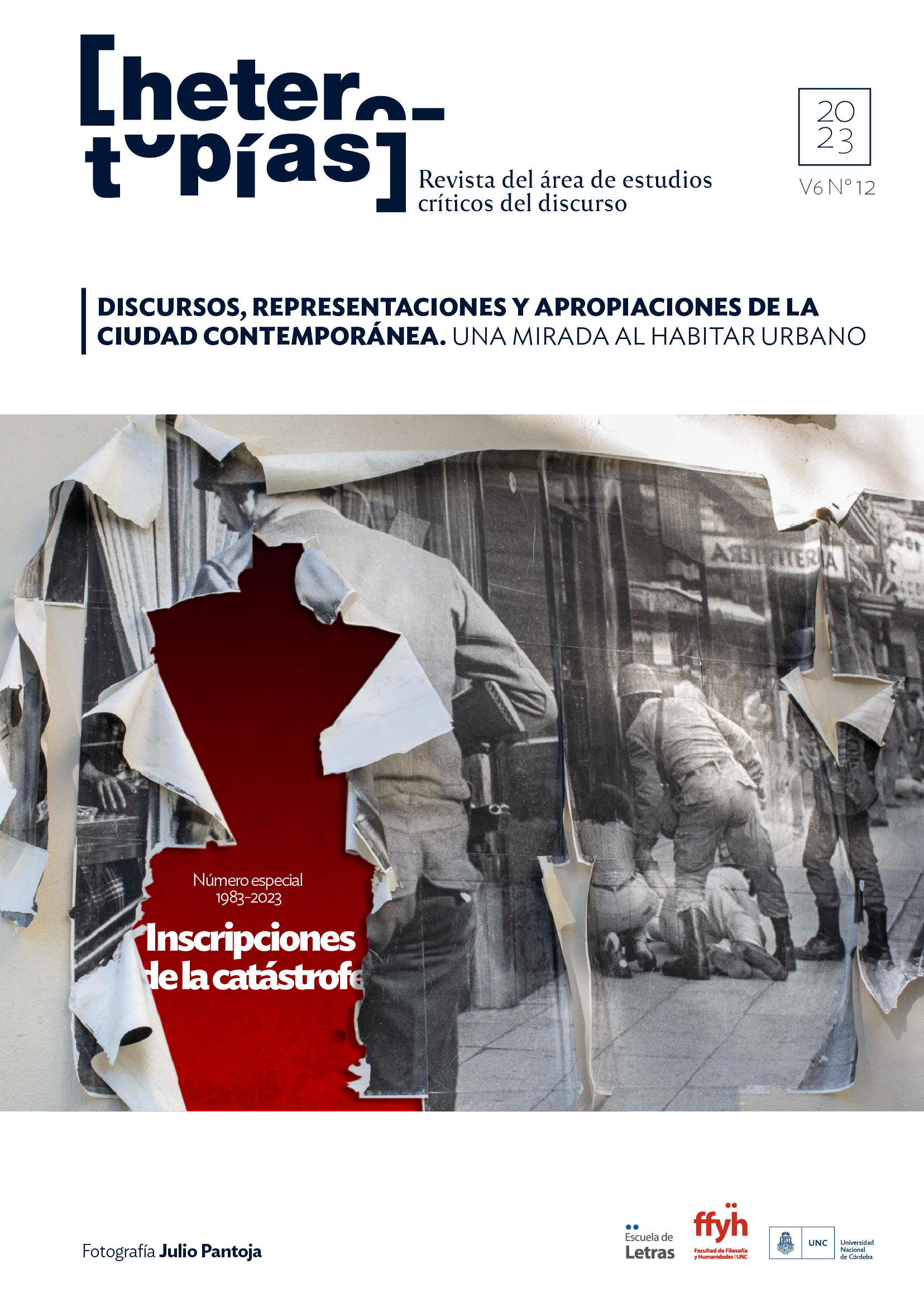"This is not the last word" A discursive analysis of the Final Document of the Military Junta
Main Article Content
Abstract
This paper presents a analysis of discourse expoused in the Documento Final de la Junta Miliar sobre la guerra contra la subversión y el terrorismo (hereinafter referred to as Documento). The historical relevance of this text and its Reading, 40 years after the democratic return in Argentina, is seen in two of its features. On the one hand, in the structuring of the content, which allows thematization of a variety of contextual events and referring to extensive historical periods without anchoring them in defined times and spaces. In the setting of a self-sacrificing declaration of principles, the story of 'the facts' is assumed with the aphorizing tone of a decalogue. From here the military voice sanctions the order to which acceptable memory practices should conform in the imminent democratic period. The second feature of the Final Document is that of the generic scene that it restores. As in previous dictatorial cycle ends, a military enunciator displays his authorization for the official word for the last time. This, which was not the last word, once again occupies the official stage to describe this parenthesis in democracy, transmit its teachings, and set the terms of a granted democracy.
Downloads
Article Details

This work is licensed under a Creative Commons Attribution-NonCommercial-ShareAlike 4.0 International License.
Those authors who have publications with this journal, accept the following terms: Those authors who have publications with this journal, accept the following terms:
a. The authors will keep their copyright and guarantee to the journal the right of first publication of their work, which will be simultaneously subject to the Creative Commons Attribution - Non-Commercial - Share Alike (by-nc-sa) Attribution License; no commercial use of the original work or any derivative works is allowed, the distribution of which must be done with a license equal to the one that regulates the original work.
b. Authors may adopt other non-exclusive license agreements for the distribution of the published version of the work (e.g., deposit it in an institutional telematic archive or publish it in a monographic volume) provided that the initial publication in this journal is indicated.
c. Authors are allowed and recommended to disseminate their work through the Internet (e.g. in institutional telematic archives or on their website) before and during the submission process, which may lead to interesting exchanges and increase the number of citations of the published work. (See The effect of open access).
How to Cite
References
González Bombal, I. (1988) Los Vecinazos Las Protestas Barriales en el Gran Buenos Aires 1981-83. Buenos Aires: Ediciones del IDES
Canelo, P. (2008). El proceso en su laberinto: la interna militar de Videla a Bignone. Buenos Aires: Prometeo
Canelo, P. (2006). La descomposición del poder militar en la Argentina: las Fuerzas Armadas durante las presidencias de Galtieri, Bignone y Alfonsín (1981-1987). En Pucciarelli, A. (Coord.), Los años de Alfonsín: ¿el poder de la democracia o la democracia del poder? (pp. 65-114). Buenos Aires: Siglo XXI
Cersósimo, F. (2022). Videla fue un liberal: los tradicionalistas católicos en tiempos de dictadura, 1976-1983. Posadas: Universidad Nacional de Misiones
Cicutín, J. et al (1984). Argentina 1983. Buenos Aires: CISEA/Centro Editor de América Latina
CISEA (1983). Un balance del “Proceso”. En CISEA (Comp.), Del colapso militar al triunfo de Alfonsín (pp. 21-39). Buenos Aires: Cuadernos del Bimestre
Feld, C. (2013). La representación televisiva de los desaparecidos: del ‘documento final...’ al programa de la CONADEP. En Mestman, M. y Varela, M. (Coords.), Masas, pueblo, multitud en cine y televisión (pp. 257-276). Buenos Aires: Eudeba
Franco, M. (2015). La ‘transición a la democracia’ en la Argentina frente a las cristalizaciones de la memoria. Caravelle, 104, 115-131
Franco, M. (2018). El ´Documento Final´ y las demandas en torno a los desaparecidos en la última etapa de la dictadura militar argentina. Antíteses, 11(21), 244-266
Galante (2016). ‘La Constitución y la prudencia’: los tres niveles de responsabilidad para el juzgamiento de las violaciones a los derechos humanos en la transición argentina. Sociohistórica, 40, 1-17
Gregorich, L. (1983). Documento y contradocumento. Revista Hum®, 104, 32-33
Lanusse, A. (1977). Mi testimonio. Buenos Aires: Lasserre
Luciani, L. (2022). El movimiento estudiantil en la Universidad Nacional de Rosario entre finales de la dictadura y la primera gestión normalizadora. PolHis, 15(30), 16-47
Maingueneau, D. (1999). Términos clave del análisis del discurso. Buenos Aires: Nueva Visión
Maingueneau, D. (2009). Analisis de textos de comunicación. Buenos Aires: Nueva Visión
Nino, C. (2015 [1996]). Juicio al mal absoluto. ¿Hasta dónde debe llegar la justicia retroactiva en casos de violaciones masivas de los derechos humanos? Buenos Aires: Siglo XXI
O’Donnell, P. (1983). Las batallas por las palabras. Revista Hum®, 105, 58-59
Robben, A. (2023). Mourning violent deaths and disappearances. En Parra, R. y Ubelaker, D., Anthropology of Violent Death (133-152) Hoboken: John Wiley
Sangrilli, C. (2023). Saúl Ubaldini. El liderazgo obrero en dictadura y democracia (1976-1991). Imago Mundi
Solís, A. C. (2016). La última dictadura y los barrios de la ciudad de Córdoba. Aproximación a las protestas de vecinos y a las intervenciones estatales hacia un vecinalismo permitido. Revista de Historia, 17, 175-201
Verbitsky, H. (2006). Civiles y militares: memoria secreta de la transición. Buenos Aires: Editorial La Página
Verbitsky, H. (2006 [1990]). Medio siglo de proclamas militares. Buenos Aires: Editorial Sudamericana
Zoppi Fontana, M. G. (1987). Los gritos del silencio. La voz del otro en el discurso autoritario. En Cuadernos del Instituto de Lingüística. Buenos Aires: Instituto de Lingüística
Vázquez, E. (1983). ¿De qué paz me hablan? Revista Hum®, 105, 18-21
